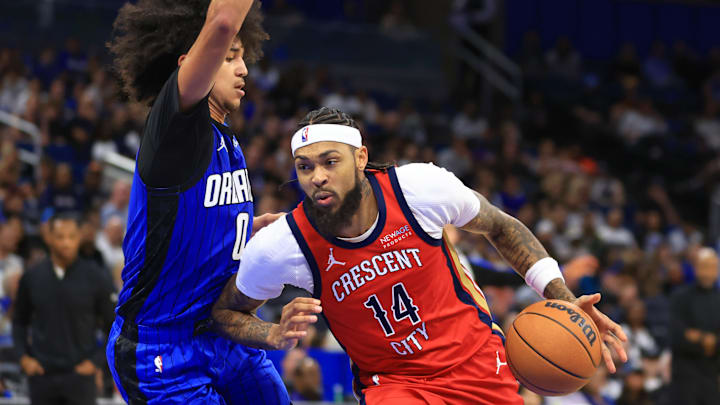Fans and analysts have been trying to trade Brandon Ingram off of the New Orleans Pelicans for years now. The first couple of seasons, he didn't get much opportunity to play alongside Zion Williamson. His game when the Pelicans first acquired him was theoretically an okay fit next to Big Z. Over time, though, as that duo accumulated more reps together, it became clear that the pairing was less than ideal.
As he developed and came more into his own, Ingram's game also shifted away from that of a complementary player and more towards one of a primary option. His defensive intensity waned and his spot-up shooting numbers plummeted while his usage rate and self-created offense skyrocketed. With Ingram becoming a point forward who did his best work inside of the arc, he suddenly had too much overlap with Zion.
The trade talks only intensified this past summer, as Ingram was preparing to enter the final year of his contract this season. Unless New Orleans can reach an agreement on an extension with him before the end of the season, he'll become an unrestricted free agent this summer. The fact that they've yet to come to a deal gave the indication that Ingram would be moved before the trade deadline, but something out of the Pelicans' control may have ruined their plans.
Tim Bontemps: Second apron may have quelled trade interest in Brandon Ingram
Last season, the NBA implemented its new Collective Bargaining Agreement with the NBA Players Association. This brought in a slew of changes to the league, including a new rule requiring 65 games played to be eligible for any of the major awards and a new salary cap structure that has had monumental impacts across the league.
The NBA's new CBA introduced a second luxury tax apron, one that would not only bring on a much more penalizing tax for offending teams but would also highly limit their ability to make further roster moves. Crossing the second apron — $17.5 million over the initial luxury tax line — would strip teams of their midlevel exception, prohibit them from aggregating salaries in any trades, prevent them from signing any potential buyout candidates or waiver wire additions for anything more than the minimum, and more.
The league's franchises have been reportedly terrified of the second apron and its consequences, and rightfully so. We've already seen some evidence of teams making moves strictly to avoid crossing it, including the Denver Nuggets letting Kentavious Caldwell-Pope walk in free agency and the Minnesota Timberwolves trading away Karl-Anthony Towns fresh off their first Conference Finals appearance since 2004.
According to ESPN's Tim Bontemps, it's also preventing teams from making moves they may have swung before the reign of the new CBA:
"Some teams, like Milwaukee, are above the second apron, and thus have lots of restrictions. Others are below the aprons, but either don't want to exceed them, or have already made moves that don't allow them to. That forced the Minnesota Timberwolves and New York Knicks to jump through hoops to pull off the Karl-Anthony Towns deal, and it chilled the market on possible deals for players such as Brandon Ingram, among others, this summer."
There's certainly a chance that the Pelicans still trade Brandon Ingram before February's deadline, in an effort to prevent losing him for naught in free agency, but the NBA's new second apron may make his market a lot cooler than initially anticipated.
